- Home
- G. K. Chesterton
What I Saw in America Page 15
What I Saw in America Read online
Page 15
It is very difficult to see how humour can be translated at all. When Sam Weller is in the Fleet Prison and Mrs. Weller and Mr. Stiggins sit on each side of the fireplace and weep and groan with sympathy, old Mr. Weller observes, ‘Vell, Sammy, I hope you find your spirits rose by this ’ere lively visit.’ I have never looked up this passage in the popular and successful French version of Pickwick; but I confess I am curious as to what French past-participle conveys the precise effect of the word ‘rose.’ A translator has not only to give the right translation of the right word but the right translation of the wrong word. And in the same way I am quite prepared to suspect that there are English jokes which an Englishman must enjoy in his own rich and romantic solitude, without asking for the sympathy of an American. But Englishmen are generally only too prone to claim this fine perception, without seeing that the fine edge of it cuts both ways. I have begun this chapter on the note of national humour because I wish to make it quite clear that I realise how easily a foreigner may take something seriously that is not serious. When I think something in America is really foolish, it may be I that am made a fool of. It is the first duty of a traveller to allow for this; but it seems to be the very last thing that occurs to some travellers. But when I seek to say something of what may be called the fantastic side of America, I allow beforehand that some of it may be meant to be fantastic. And indeed it is very difficult to believe that some of it is meant to be serious. But whether or no there is a joke, there is certainly an inconsistency; and it is an inconsistency in the moral make-up of America which both puzzles and amuses me.
The danger of democracy is not anarchy but convention. There is even a sort of double meaning in the word ‘convention’; for it is also used for the most informal and popular sort of parliament; a parliament not summoned by any king. The Americans come together very easily without any king; but their coming together is in every sense a convention, and even a very conventional convention. In a democracy riot is rather the exception and respectability certainly the rule. And though a superficial sight-seer should hesitate about all such generalisations, and certainly should allow for enormous exceptions to them, he does receive a general impression of unity verging on uniformity. Thus Americans all dress well; one might almost say that American women all look well; but they do not, as compared with Europeans, look very different. They are in the fashion; too much in the fashion even to be conspicuously fashionable. Of course there are patches, both Bohemian and Babylonian, of which this is not true, but I am talking of the general tone of a whole democracy. I have said there is more respectability than riot; but indeed in a deeper sense the same spirit is behind both riot and respectability. It is the same social force that makes it possible for the respectable to boycott a man and for the riotous to lynch him. I do not object to it being called ‘the herd instinct,’ so long as we realise that it is a metaphor and not an explanation.
Public opinion can be a prairie fire. It eats up everything that opposes it; and there is the grandeur as well as the grave disadvantages of a natural catastrophe in that national unity. Pacifists who complained in England of the intolerance of patriotism have no notion of what patriotism can be like. If they had been in America, after America had entered the war, they would have seen something which they have always perhaps subconsciously dreaded, and would then have beyond all their worst dreams detested; and the name of it is democracy. They would have found that there are disadvantages in birds of a feather flocking together; and that one of them follows on a too complacent display of the white feather. The truth is that a certain flexible sympathy with eccentrics of this kind is rather one of the advantages of an aristocratic tradition. The imprisonment of Mr. Debs, the American Pacifist, which really was prolonged and oppressive, would probably have been shortened in England where his opinions were shared by aristocrats like Mr. Bertrand Russell and Mr. Ponsonby. A man like Lord Hugh Cecil could be moved to the defence of conscientious objectors, partly by a true instinct of chivalry; but partly also by the general feeling that a gentleman may very probably have aunts and uncles who are quite as mad. He takes the matter personally, in the sense of being able to imagine the psychology of the persons. But democracy is no respecter of persons. It is no respecter of them, either in the bad and servile or in the good and sympathetic sense. And Debs was nothing to democracy. He was but one of the millions. This is a real problem, or question in the balance, touching different forms of government; which is, of course, quite neglected by the idealists who merely repeat long words. There was during the war a society called the Union of Democratic Control, which would have been instantly destroyed anywhere where democracy had any control, or where there was any union. And in this sense the United States have most emphatically got a union. Nevertheless I think there is something rather more subtle than this simple popular solidity behind the assimilation of American citizens to each other. There is something even in the individual ideals that drives towards this social sympathy. And it is here that we have to remember that biological fancies like the herd instinct are only figures of speech, and cannot really cover anything human. For the Americans are in some ways a very self-conscious people. To compare their social enthusiasm to a stampede of cattle is to ask us to believe in a bull writing a diary or a cow looking in a looking-glass. Intensely sensitive by their very vitality, they are certainly conscious of criticism and not merely of a blind and brutal appetite. But the peculiar point about them is that it is this very vividness in the self that often produces the similarity. It may be that when they are unconscious they are like bulls and cows. But it is when they are self-conscious that they are like each other.
Individualism is the death of individuality. It is so, if only because it is an ‘ism.’ Many Americans become almost impersonal in their worship of personality. Where their natural selves might differ, their ideal selves tend to be the same. Anybody can see what I mean in those strong self-conscious photographs of American business men that can be seen in any American magazine. Each may conceive himself to be a solitary Napoleon brooding at St. Helena; but the result is a multitude of Napoleons brooding all over the place. Each of them must have the eyes of a mesmerist; but the most weak-minded person cannot be mesmerised by more than one millionaire at a time. Each of the millionaires must thrust forward his jaw, offering (if I may say so) to fight the world with the same weapon as Samson. Each of them must accentuate the length of his chin, especially, of course, by always being completely clean-shaven. It would be obviously inconsistent with Personality to prefer to wear a beard. These are of course fantastic examples on the fringe of American life; but they do stand for a certain assimilation, not through brute gregariousness, but rather through isolated dreaming. And though it is not always carried so far as this, I do think it is carried too far. There is not quite enough unconsciousness to produce real individuality. There is a sort of worship of will-power in the abstract, so that people are actually thinking about how they can will, more than about what they want. To this I do think a certain corrective could be found in the nature of English eccentricity. Every man in his humour is most interesting when he is unconscious of his humour; or at least when he is in an intermediate stage between humour in the old sense of oddity and in the new sense of irony. Much is said in these days against negative morality; and certainly most Americans would show a positive preference for positive morality. The virtues they venerate collectively are very active virtues; cheerfulness and courage and vim, otherwise zip, also pep and similar things. But it is sometimes forgotten that negative morality is freer than positive morality. Negative morality is a net of a larger and more open pattern, of which the lines or cords constrict at longer intervals. A man like Dr. Johnson could grow in his own way to his own stature in the net of the Ten Commandments; precisely because he was convinced there were only ten of them. He was not compressed into the mould of positive beauty, like that of the Apollo Belvedere or the American citizen.
This criticism is somet
imes true even of the American woman, who is certainly a much more delightful person than the mesmeric millionaire with his shaven jaw. Interviewers in the United States perpetually asked me what I thought of American women, and I confessed a distaste for such generalisations which I have not managed to lose. The Americans, who are the most chivalrous people in the world, may perhaps understand me; but I can never help feeling that there is something polygamous about talking of women in the plural at all; something unworthy of any American except a Mormon. Nevertheless, I think the exaggeration I suggest does extend in a less degree to American women, fascinating as they are. I think they too tend too much to this cult of impersonal personality. It is a description easy to exaggerate even by the faintest emphasis; for all these things are subtle and subject to striking individual exceptions. To complain of people for being brave and bright and kind and intelligent may not unreasonably appear unreasonable. And yet there is something in the background that can only be expressed by a symbol, something that is not shallowness but a neglect of the subconsciousness and the vaguer and slower impulses; something that can be missed amid all that laughter and light, under those starry candelabra of the ideals of the happy virtues. Sometimes it came over me, in a wordless wave, that I should like to see a sulky woman. How she would walk in beauty like the night, and reveal more silent spaces full of older stars! These things cannot be conveyed in their delicate proportion even in the most detached description. But the same thing was in the mind of a white-bearded old man I met in New York, an Irish exile and a wonderful talker, who stared up at the tower of gilded galleries of the great hotel, and said with that spontaneous movement of style which is hardly heard except from Irish talkers: ‘And I have been in a village in the mountains where the people could hardly read or write; but all the men were like soldiers, and all the women had pride.’
It sounds like a poem about an Earthly Paradise to say that in this land the old women can be more beautiful than the young. Indeed, I think Walt Whitman, the national poet, has a line somewhere almost precisely to that effect. It sounds like a parody upon Utopia, and the image of the lion lying down with the lamb, to say it is a place where a man might almost fall in love with his mother-in-law. But there is nothing in which the finer side of American gravity and good feeling does more honourably exhibit itself than in a certain atmosphere around the older women. It is not a cant phrase to say that they grow old gracefully; for they do really grow old. In this the national optimism really has in it the national courage. The old women do not dress like young women; they only dress better. There is another side to this feminine dignity in the old, sometimes a little lost in the young, with which I shall deal presently. The point for the moment is that even Whitman’s truly poetic vision of the beautiful old women suffers a little from that bewildering multiplicity and recurrence that is indeed the whole theme of Whitman. It is like the green eternity of Leaves of Grass. When I think of the eccentric spinsters and incorrigible grandmothers of my own country, I cannot imagine that any one of them could possibly be mistaken for another, even at a glance. And in comparison I feel as if I had been travelling in an Earthly Paradise of more decorative harmonies; and I remember only a vast cloud of grey and pink as of the plumage of cherubim in an old picture. But on second thoughts, I think this may be only the inevitable effect of visiting any country in a swift and superficial fashion; and that the grey and pink cloud is probably an illusion, like the spinning prairies scattered by the wheel of the train.
Anyhow there is enough of this equality, and of a certain social unity favourable to sanity, to make the next point about America very much of a puzzle. It seems to me a very real problem, to which I have never seen an answer even such as I shall attempt here, why a democracy should produce fads; and why, where there is so genuine a sense of human dignity, there should be so much of an impossible petty tyranny. I am not referring solely or even specially to Prohibition, which I discuss elsewhere. Prohibition is at least a superstition, and therefore next door to a religion; it has some imaginable connection with moral questions, as have slavery or human sacrifice. But those who ask us to model ourselves on the States which punish the sin of drink forget that there are States which punish the equally shameless sin of smoking a cigarette in the open air. The same American atmosphere that permits Prohibition permits of people being punished for kissing each other. In other words, there are States psychologically capable of making a man a convict for wearing a blue neck-tie or having a green front-door, or anything else that anybody chooses to fancy. There is an American atmosphere in which people may some day be shot for shaking hands, or hanged for writing a post-card.
As for the sort of thing to which I refer, the American newspapers are full of it and there is no name for it but mere madness. Indeed it is not only mad, but it calls itself mad. To mention but one example out of many, it was actually boasted that some lunatics were teaching children to take care of their health. And it was proudly added that the children were ‘health-mad.’ That it is not exactly the object of all mental hygiene to make people mad did not occur to them; and they may still be engaged in their earnest labours to teach babies to be valetudinarians and hypochondriacs in order to make them healthy. In such cases, we may say that the modern world is too ridiculous to be ridiculed. You cannot caricature a caricature. Imagine what a satirist of saner days would have made of the daily life of a child of six, who was actually admitted to be mad on the subject of his own health. These are not days in which that great extravaganza could be written; but I dimly see some of its episodes like uncompleted dreams. I see the child pausing in the middle of a cart-wheel, or when he has performed three-quarters of a cart-wheel, and consulting a little note-book about the amount of exercise per diem. I see him pausing half-way up a tree, or when he has climbed exactly one-third of a tree; and then producing a clinical thermometer to take his own temperature. But what would be the good of imaginative logic to prove the madness of such people, when they themselves praise it for being mad?
There is also the cult of the Infant Phenomenon, of which Dickens made fun and of which educationalists make fusses. When I was in America another newspaper produced a marvellous child of six who had the intellect of a child of twelve. The only test given, and apparently one on which the experiment turned, was that she could be made to understand and even to employ the word ‘annihilate.’ When asked to say something proving this, the happy infant offered the polished aphorism, ‘When common sense comes in, superstition is annihilated.’ In reply to which, by way of showing that I also am as intelligent as a child of twelve, and there is no arrested development about me, I will say in the same elegant diction, ‘When psychological education comes in, common sense is annihilated.’ Everybody seems to be sitting round this child in an adoring fashion. It did not seem to occur to anybody that we do not particularly want even a child of twelve to talk about annihilating superstition; that we do not want a child of six to talk like a child of twelve, or a child of twelve to talk like a man of fifty, or even a man of fifty to talk like a fool. And on the principle of hoping that a little girl of six will have a massive and mature brain, there is every reason for hoping that a little boy of six will grow a magnificent and bushy beard.
Now there is any amount of this nonsense cropping up among American cranks. Anybody may propose to establish coercive Eugenics; or enforce psychoanalysis—that is, enforce confession without absolution. And I confess I cannot connect this feature with the genuine democratic spirit of the mass. I can only suggest, in concluding this chapter, two possible causes rather peculiar to America, which may have made this great democracy so unlike all other democracies, and in this so manifestly hostile to the whole democratic idea.
The first historical cause is Puritanism; but not Puritanism merely in the sense of Prohibitionism. The truth is that prohibitions might have done far less harm as prohibitions, if a vague association had not arisen, on some dark day of human unreason, between prohibition and
progress. And it was the progress that did the harm, not the prohibition. Men can enjoy life under considerable limitations, if they can be sure of their limited enjoyments; but under Progressive Puritanism we can never be sure of anything. The curse of it is not limitation; it is unlimited limitation. The evil is not in the restriction; but in the fact that nothing can ever restrict the restriction. The prohibitions are bound to progress point by point; more and more human rights and pleasures must of necessity be taken away; for it is of the nature of this futurism that the latest fad is the faith of the future, and the most fantastic fad inevitably makes the pace. Thus the worst thing in the seventeenth-century aberration was not so much Puritanism as sectarianism. It searched for truth not by synthesis but by subdivision. It not only broke religion into small pieces, but it was bound to choose the smallest piece. There is in America, I believe, a large religious body that has felt it right to separate itself from Christendom because it cannot believe in the morality of wearing buttons. I do not know how the schism arose; but it is easy to suppose, for the sake of argument, that there had originally existed some Puritan body which condemned the frivolity of ribbons though not of buttons. I was going to say of badges but not buttons; but on reflection I cannot bring myself to believe that any American, however insane, would object to wearing badges. But the point is that as the holy spirit of progressive prophesy rested on the first sect because it had invented a new objection to ribbons, so that holy spirit would then pass from it to the new sect who invented a further objection to buttons. And from them it must inevitably pass to any rebel among them who shall choose to rise and say that he disapproves of trousers because of the existence of trouser-buttons. Each secession in turn must be right because it is recent, and progress must progress by growing smaller and smaller. That is the progressive theory, the legacy of seventeenth-century sectarianism, the dogma implied in much modern politics, and the evident enemy of democracy. Democracy is reproached with saying that the majority is always right. But progress says that the minority is always right. Progressives are prophets; and fortunately not all the people are prophets. Thus in the atmosphere of this slowly dying sectarianism anybody who chooses to prophesy and prohibit can tyrannise over the people. If he chooses to say that drinking is always wrong, or that kissing is always wrong, or that wearing buttons is always wrong, people are afraid to contradict him for fear they should be contradicting their own great-grandchild. For their superstition is an inversion of the ancestor-worship of China; and instead of vainly appealing to something that is dead, they appeal to something that may never be born.

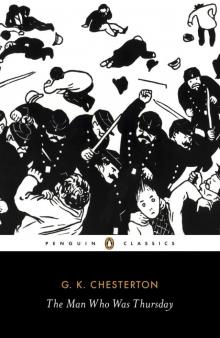 The Man Who Was Thursday: A Nightmare
The Man Who Was Thursday: A Nightmare The Napoleon of Notting Hill
The Napoleon of Notting Hill The Wisdom of Father Brown
The Wisdom of Father Brown G K Chesterton- The Dover Reader
G K Chesterton- The Dover Reader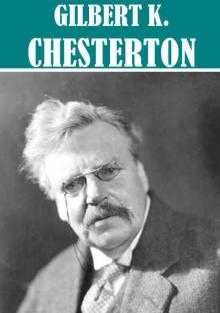 The Essential G. K. Chesterton
The Essential G. K. Chesterton The Trees of Pride
The Trees of Pride The Man Who Knew Too Much
The Man Who Knew Too Much The Ball and the Cross
The Ball and the Cross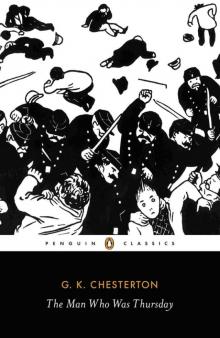 The Man Who Was Thursday (Penguin ed)
The Man Who Was Thursday (Penguin ed) The Innocence of Father Brown
The Innocence of Father Brown The Victorian Age in Literature
The Victorian Age in Literature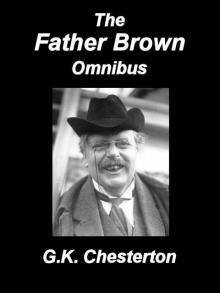 Father Brown Omnibus
Father Brown Omnibus Murder On Christmas Eve
Murder On Christmas Eve The Blue Cross
The Blue Cross The Complete Father Brown Mysteries Collection
The Complete Father Brown Mysteries Collection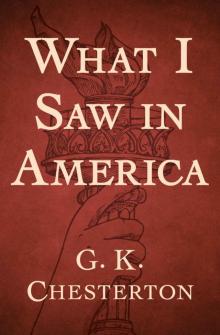 What I Saw in America
What I Saw in America